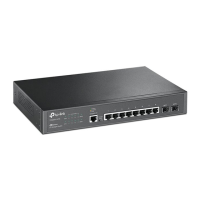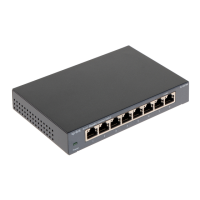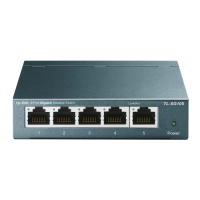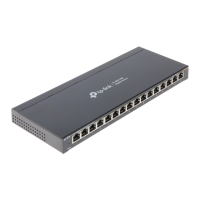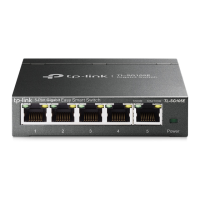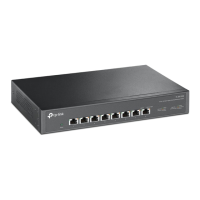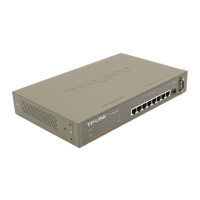Configuring Spanning Tree MSTP Configurations
User Guide
419
Interface Prio Cost Role Status LAG
----------- ------ ------ -------- --------- -------
Gi1/0/3 144 200 N/A LnkDwn N/A
Switch(config-if)#end
Switch#copy running-config startup-config
3.2.3 Configuring Global MSTP Parameters
Follow these steps to configure the global MSTP parameters of the switch:
Step 1 configure
Enter global configuration mode.
Step 2 spanning-tree priority
pri
Configure the priority of the switch for comparison in CIST.
pri
: Specify the priority for the switch. The valid value is from 0 to 61440, which are divisible
by 4096. The priority is a parameter used to determine the root bridge for spanning tree. The
switch with the lower value has the higher priority.
In STP/RSTP, the value is the priority of the switch in spanning tree. The switch with the highest
priority will be elected as the root bridge.
In MSTP, the value is the priority of the switch in CIST. The switch with the higher priority will be
elected as the root bridge in CIST.
Step 3 spanning-tree timer {[ forward-time
forward-time
] [ hello-time
hello-time
] [ max-age
max-
age
]}
(Optional) Configure the Forward Delay, Hello Time and Max Age.
forward-time:
Specify the value of Forward Delay. It is the interval between the port state
transition from listening to learning. The valid values are from 4 to 30 in seconds, and the default
value is 15. Forward Delay is used to prevent the network from causing temporary loops during
the regeneration of spanning tree. The interval between the port state transition from learning
to forwarding is also the Forward Delay.
hello-time:
Specify the value of Hello Time. It is the interval between BPDUs’ sending. The
valid values are from 1 to 10 in seconds, and the default value is 2. The root bridge sends
configuration BPDUs at an interval of Hello Time. It works with the MAX Age to test the link
failures and maintain the spanning tree.
max-age:
Specify the value of Max Age. It is the maximum time that the switch can wait without
receiving a BPDU before attempting to regenerate a new spanning tree. The valid values are
from 6 to 40 in seconds, and the default value is 20.
Step 4 spanning-tree hold-count
value
(Optional) Specify the maximum number of BPDU that can be sent in a second.
value:
Specify the maximum number of BPDU packets that can be sent in a second. The valid
values are from 1 to 20 pps, and the default value is 5.

